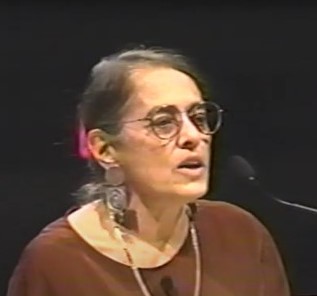
September 25, 2023, by Brigitte Nerlich
Evelyn Fox Keller (1936-2023)
On 22 September 2023 Evelyn Fox Keller sadly passed away at the age of 87. She had been a theoretical physicist, a mathematical biologist, a feminist philosopher, a historian of science, and an inspiration to many across these fields. She integrated insights from all these fields creatively and critically, and, most importantly, she added some spice to this fusion of ideas by thinking very deeply about the role of metaphor in science.
One of her last articles I read was her 2020 contribution to Interdisciplinary Science Reviews in which she discussed the “Cognitive functions of metaphor in the natural sciences”. This article was itself a contribution to a special issue entitled “Making Sense of Metaphor: Evelyn Fox Keller and commentators on language and science” – which echoes the title of one of her books Making Sense of Life: Explaining Biological Development with Models, Metaphors, and Machines. For anybody interested in metaphors and science her work was and is essential reading.
Metaphors are cognitive and communicational tools that allow us to confront the unknown with the known and to generate the better known. Keller stressed something that needs stressing over and over again, namely that metaphor “accrues its value in the instability it generates by confronting similarity with difference, insisting that man both is and is not a wolf” or, indeed, that genomes both are and are not books. This instability is the basis of a metaphor’s vitality. Over time, metaphors lose that vitality. Where once they made us see the world afresh and kept our eyes open and alert, they can come to close our eyes to novelty and danger. This has great implications for science.
Keller wanted to find out how metaphors shape the way scientists see the world and the science they do and how some metaphors may make them blind to seeing things not highlighted by the metaphors once chosen by them in the past. She was particularly interested in studying this dynamic in the life sciences where rather static and linear metaphors might make it difficult to see and explore the dynamic nature of living systems.
I wish I had been able to read this 2020 article when I was writing an article also published in 2020 and entitled “Encounters between life and language” in which I called for a new language of life.
The beginning of that article focused on a seminal encounter between the anthropologist Claude Lévi-Strauss, the molecular biologist François Jacob, the linguist Roman Jakobson and the geneticist Philippe L’Héritier during a televised debate entitled “Vivre et parler” or “Living and speaking”, in Paris in 1967 (see Lily Kay’s seminal analysis here). This was the time when all the dominant, and now troubling, metaphors for genes and genomes had emerged; those of the code, the map, the book, the blueprint, the programme and were used across disciplines. These metaphors were incredibly useful at the time for inspiring novel thinking about life and language, but their usefulness has somewhat unravelled over time, an unravelling that Keller has meticulously observed and dissected.
At the end of my article I asked whether, given that the life sciences are increasingly embracing complexity, flexibility and even randomness and chance, one should perhaps try to organise another encounter between biologists, linguists, anthropologists, science writers and communicators and others to talk through linguistic difficulties, past and present, and linguistic opportunities, present and future before some other troubling metaphors emerge? Such an encounter is well overdue, but if ever it was organised, one important participant would now be missing: Evelyn Fox Keller.
As early as 2005, she had called for the construction of “a more appropriate linguistic framework” for the life sciences, building on the emergence of a “new lexicon” which is itself grounded in an emerging new theoretical framework that shifts the focus of research to “the dynamic interactivity of living systems”. It would have been great to have her thoughts on recent developments in science, language and society.
PS For a longer and more detailed story of her life and work, please read this obituary, by Angela N. H. Creager in Science, published on 30 November 2023.
Image: Evelyn Fox Keller. Nobel Conference XXXV at Gustavus Adolphus College October 5 and 6, 1999 (Wikipedia)
Previous Post
From Omicron to Omega: What’s in a name?No comments yet, fill out a comment to be the first

Leave a Reply